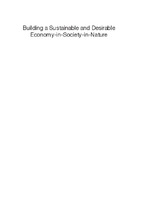Building a Sustainable and Desirable Economy-in-Society-in-Nature
Report to the United Nations for the 2012 Rio+20 Conference
Author(s)
Costanza, Robert
Alperovitz, Gar
Daly, Herman
Farley, Joshua
Franco, Carol
Jackson, Tim
Kubiszewski, Ida
Schor, Juliet
Victor, Peter
Language
EnglishAbstract
The world has changed dramatically. We no longer live in a world relatively empty of humans and their artifacts. We now live in the “Anthropocene,” era in a full world where humans are dramatically altering our ecological life-support system. Our traditional economic concepts and models were developed in an empty world. If we are to create sustainable prosperity, if we seek “improved human well-being and social equity, while significantly reducing environmental risks and ecological scarcities,” we are going to need a new vision of the economy and its relationship to the rest of the world that is better adapted to the new conditions we face. We are going to need an economics that respects planetary boundaries, that recognizes the dependence of human well-being on social relations and fairness, and that recognizes that the ultimate goal is real, sustainable human well-being, not merely growth of material consumption. This new economics recognizes that the economy is embedded in a society and culture that are themselves embedded in an ecological life-support system, and that the economy cannot grow forever on this finite planet. In this report, we discuss the need to focus more directly on the goal of sustainable human well-being rather than merely GDP growth. This includes protecting and restoring nature, achieving social and intergenerational fairness (including poverty alleviation), stabilizing population, and recognizing the significant nonmarket contributions to human well-being from natural and social capital. To do this, we need to develop better measures of progress that go well beyond GDP and begin to measure human well-being and its sustainability more directly.
Keywords
environmental policy; economic development--environmental aspects; Ecosystem; Ecosystem services; Gross domestic product; Natural capital; Quality of life; Social capital; Well-beingDOI
10.26530/OAPEN_462196ISBN
9781921862052OCN
1030815851Publisher
ANU PressPublisher website
https://press.anu.edu.au/Publication date and place
Canberra, 2013Classification
Sustainability
Alternative and renewable energy sources and technology


 Download
Download Web Shop
Web Shop